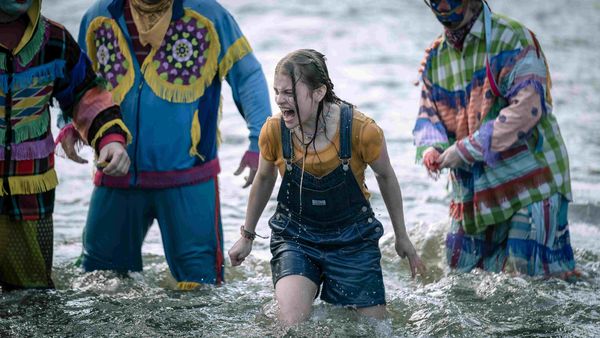Eye For Film >> Movies >> Wet Monday (2024) Film Review
Wet Monday
Reviewed by: Evgenija Arsova

Once every year on an Easter Monday the Polish people engage in a traditional celebration named Wet Monday, where playful water fights take place. This holiday is quite controversial, since on this day personal boundaries become so vague that there is no way to define when joy ends, and violence begins. Justyna Mytnik's film of the same name shows an ordinary annual celebration which culminates in a young polish girl being stripped of her innocence, by an unknown local boy.
Klara (Julia Polaczek), a girl in her early teens, enjoys a simple life with her family in the Polish countryside. Her older sister, Marta (Nel Kaczmarek), is both her protector and role model, which leads Klara to mimic her and desperately try to fit in with her friends. As Easter approaches, Klara develops a phobia of getting wet. Amid this turmoil, she finds refuge in the company of Diana (Weronika Kozakowska), a local girl fascinated by the occult, who is often mocked by their peers. Early in their friendship, the truth of Klara’s assault during the previous Wet Monday celebration emerges – an experience suppressed by her sister – which drives Klara to seek some form of catharsis.

There is a uniqueness to the way the story unfolds, blending Christian and pagan symbolism, as Catholic practices intermingle with elements of witchcraft, culminating in the Wet Monday celebration. This combination shifts the narrative toward a quasi-fairy tale. While these romanticised themes are intriguing in theory, the filmmaker must justify their use. Mytnik makes a compelling case, yet inconsistencies arise in the story's execution. Several plot holes surface in an attempt for diverse themes to coalesce, which exposes the immaturities in filmmaking. Klara's surreal dreams – where she adopts an Indiana Jones-like persona in search of golden chocolate Easter eggs, guided by the voice of a goddess figure – further blur the line between fantasy and reality, leaving viewers with more questions than answers.
Each scene draws viewers into a sensory feast, where meticulous sound mixing harmonises with breathtaking cinematography. The use of technicolor enriches the visual experience, aligning it with the narrative’s fantastical tone. An intricate auditory landscape envelops the audience, with every sound – from rustling leaves to children’s laughter – creating a vivid backdrop for the unfolding drama. This rich soundscape, combined with stunning visuals of the lush Polish countryside, makes the film almost addictive to watch.
Wet Monday explores the complexities of personal boundaries and the trauma of assault, weaving a rich tapestry of symbolism that challenges viewers to confront their understandings of innocence and violation. Visually stunning, the film captivates with its beauty, but falls short of maturity. The contrast between celebration and tragedy underscores the fragility of purity, inviting reflection on the importance of defining boundaries and the impact of societal silence on individual autonomy.
Reviewed on: 17 Oct 2024














